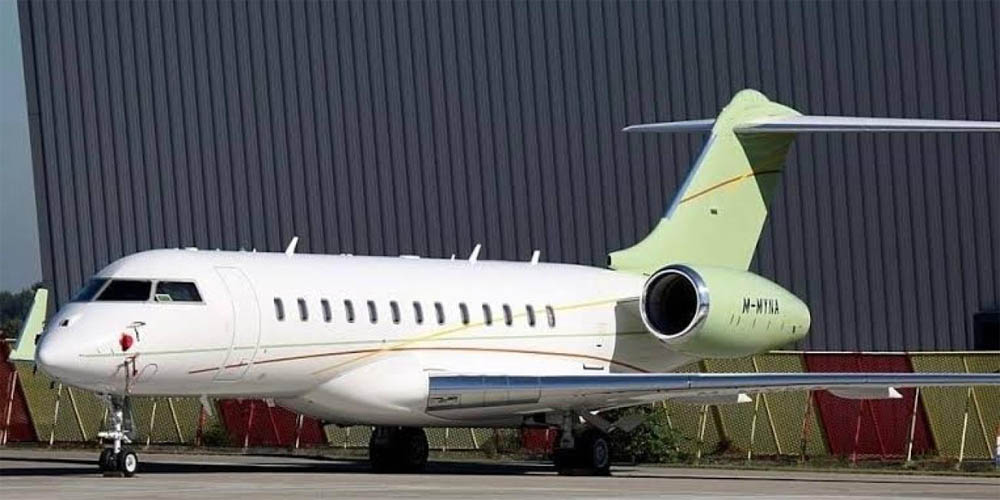Business
Nigerian airlines can’t survive current economic crisis – Fairfax Africa boss alerts

Nigerian airlines can’t survive current economic crisis – Fairfax Africa boss alerts
The Fairfax Africa Fund, backers of the ill-fated national carrier, Nigeria Air, has issued a stark forecast, predicting the collapse of all domestic airlines currently operating in Nigeria amidst the country’s worsening economic crisis. According to Zemedeneh Negatu, Global Chairman of Fairfax Africa Fund, only one airline among Nigeria’s domestic carriers has a chance of weathering the economic storm.
Negatu’s foreboding projection follows a statement by Prof. Obiora Okonkwo, Chairman of United Nigeria Airlines, in which he described Nigeria’s aviation sector as being on “life support.”
Addressing Okonkwo’s concerns, Negatu expressed that the current state of domestic airlines is dire, insisting that no amount of government bailouts—no matter how generous—could save the majority of them from inevitable collapse.
“None of Nigeria’s airlines operating today, except one, will survive even if they were to be given tens of millions of dollars in government (taxpayer) bailouts in perpetuity,” Negatu asserted, without elaborating on the specific reasons behind this grim outlook.
However, the Fairfax chairman did not stop at predictions.
He leveled serious accusations against two leading Nigerian airlines—Air Peace and United Nigeria Airlines—alleging that they had orchestrated the failure of Nigeria Air through legal actions spearheaded by the Airline Operators of Nigeria (AON). Negatu claimed that Nigeria Air would have been a lifeline for the industry, potentially stabilising it and attracting significant foreign investment, but that these efforts were thwarted by what he described as self-serving interests masked as patriotism.
READ ALSO:
- Shiites have declared war, says FCT police commissioner
- Human rights abuses using DSS, police rising under Tinubu – Atiku
- NAF airstrikes kill terrorists in Kaduna, Zamfara, destroy 25 illegal refineries
“Promoting self-interest under the guise of ‘patriotism’ is not a viable long-term business strategy,” Negatu declared. “The efforts by United Nigeria and Air Peace to block a substantial Foreign Direct Investment (FDI) into Nigeria, including significant American investment, will deter others from considering the much-needed FDI in the sector.”
Negatu’s comments come in the wake of a landmark judgment on August 5, 2024, by Justice Lewis Allagoa of the Federal High Court in Lagos. The court ruled the sale of shares in Nigeria Air to Ethiopian Airlines as illegal, citing multiple violations of existing laws, including the Companies and Allied Matters Act and Securities and Exchange Commission regulations. The court invalidated the entire bidding process, revoked Nigeria Air’s Air Transport License, and permanently barred the former Minister of Aviation, Hadi Sirika, and Ethiopian Airlines from further involvement in the project.
Reacting to Negatu’s dire forecast and allegations, Prof. Obiora Okonkwo, spokesperson for the Airline Operators of Nigeria (AON), dismissed the claims as misguided. He pointed out that the harsh economic conditions affecting the aviation sector are a reality everyone is grappling with and not a result of Fairfax’s predictions.
“It doesn’t take a soothsayer to know that the economic environment in Nigeria is harsh and doesn’t only affect the aviation sector,” Okonkwo told Daily Sun.
He added: “If anything happens to airline operators in Nigeria, it won’t be because of Negatu’s prediction but due to the broader economic environment. The survival of Nigeria’s aviation sector so far is because the ‘evil’ intentions of Ethiopian Airlines and their collaborators under the guise of Nigeria Air failed. If it had succeeded, it would have sent the aviation industry to an early grave.”
On the accusation that Air Peace and United Nigeria spearheaded the downfall of Nigeria Air, Okonkwo was emphatic in his defense. He acknowledged that both he and Allen Onyema, Chairman of Air Peace, are indeed members of the AON, the body that took the federal government and Ethiopian Airlines to court, effectively safeguarding the aviation sector from what he described as a catastrophic plan.
READ ALSO:
- Napoli agree deal with Man Utd for McTominay
- Court freezes 32 bank accounts linked to #EndBadGovernance protest, orders holders arrest (+FULL LIST)
- Sudan won’t join peace talks, says army leader
“Ethiopian Airlines had the opportunity in court to present evidence of their investment, and if they had done so, the outcome—which permanently banned them from owning shares—would have been different,” Okonkwo argued.
He continued: “We can understand Negatu’s pain because from being a transaction advisor, he was to get three percent shares from Nigeria Air for doing nothing and also be the only person to do all the procurement. He is a cry baby and if he says that Air Peace and United Nigeria are the ring leaders, then we are very proud to be part of the AON which saved Nigeria from their dubious transactions. We consider ourselves heroes because they couldn’t contradict any accusations that the AON made against them in court which are that the transaction is dubious and they just wanted monopoly which would have drained our economy.
“The then administration signed that the government will indemnify ET from every debt they would have accrued. In the agreement, ET wasn’t supposed to invest money to buy aircraft on behalf of the partnership. The airline would continue to lease to the partnership on wet lease, so the money they would have been indemnified against would have been in billions of dollars to buy aircraft for ET, which they would in turn, lease to Nigeria. ET and their Nigerian dubious collaborators would have been the only ones profiting. There would have been nothing for Nigerians to gain,” Okonkwo said.
In a rapidly-changing landscape, the battle for the soul of Nigeria’s aviation industry remains fierce, with accusations and counter-accusations flying between stakeholders. As the dust settles on the Nigeria Air debacle, the future of the country’s aviation sector hangs in the balance, clouded by economic uncertainty and the specter of past controversies.
Nigerian airlines can’t survive current economic crisis – Fairfax Africa boss alerts
Auto
Coscharis Motors clinches Nigeria’s Multi-Luxury Company Award as Range Rover Autobiography emerges Luxury SUV

Coscharis Motors clinches Nigeria’s Multi-Luxury Company Award as Range Rover Autobiography emerges Luxury SUV
It is a double honour for Coscharis Motors Plc, one of the subsidiaries of the respected conglomerate, Coscharis Group, as it was declared Multi-Luxury Company of the Year and one of its iconic luxury brands, Range Rover Autobiography, was adjudged the Nigeria’s Luxury SUV of the Year at the 2024 edition of the Nigeria Auto Journalists Association Awards.
The well attended event was held recently at the prestigious Oriental Hotels, Lagos.
Coscharis Motors, a household name in topnotch globally respected luxury automobile brands in Nigeria, has been the exclusive representative of the British iconic luxury brand of the Jaguar Land Rover and the German pride in the luxury segment of the BMW brand over many decades.
The company in 2023 added another new luxury brand from United Kingdom into the Nigeria market which is the Grenadier from the Ineos group in UK. The Grenadier is a brand new product globally which is equally being represented in Nigeria by Coscharis Motors as a new addition to its existing ‘House of luxury’ when it comes to automobile of repute.
The luxury SUV category was keenly contested with other tested luxury brands but the Range Rover Autobiography came tops, according to the organizers, after strong consideration of the market acceptance of the Autobiography in all ramifications.
The All New Range Rover Autobiography variant is revolutionary, reliable and a class on its own with its special appeal, style that resonates with its priority audience when it comes to luxury, class, comfort and performance.
Receiving the award on behalf of Coscharis Motors, the General Manager, Marketing and Corporate Communications, Coscharis Group, Mr. Abiona Babarinde, dedicated the award to all the Coscharis Motors customers, especially the luxury brand enthusiasts for their acceptability of all the luxury brands in the Portfolio namely the Jaguar Land Rover, BMW and the new Grenadier respectively as their preferred luxury automobile of choice.
He said, “These awards only reconfirm our expertise in delivering top notch luxury experience to our premium customers while maintaining the global standard of brand positioning to discerning customers in the ever dynamic Nigerian market.
“Representing these globally respected iconic brands over the years exclusively in Nigeria involves consistent delivering of value for money that involves the total luxury experience from the point of brand awareness to the purchase stage and the aftersales service experience to deliver the peace of mind required.”
Group Managing Director of Coscharis Motors Plc, Mr. Josiah Samuel, also dedicated the awards to the company’s ever loyal customers for their patronage and acceptance of the brands with a promise to continually create more value in the automobile industry in Nigeria.
He said, “There can’t be another best way to end the business year in 2024 than with these set of prestigious awards despite all the business challenges in the year and more importantly that the awards are coming from a very critical stakeholder / partner like the media.”
The award event attracted various stakeholders that are players in the automotive sector in Nigeria.
Auto
Leadership by example: FRSC Corps Marshal leads field operations, patrol highways

Leadership by example: FRSC Corps Marshal leads field operations, patrol highways
By Bisi Kazeem
As the year winds down and Nigerians embark on end-of-year travels, the Federal Road Safety Corps (FRSC) has intensified its efforts to curb road crashes and ensure safer highways. Leading this charge is the Corps Marshal, Shehu Mohammed, who has set a sterling example of sacrificial leadership by actively participating in frontline operations during this critical period.
The end of the year is a notoriously perilous time on Nigeria’s roads, marked by increased traffic, heightened road traffic crash risks, and a surge in reckless driving.
However, under the proactive leadership of the Corps Marshal, the FRSC rolled out an unprecedented campaign to reduce road traffic crashes and fatalities, ensuring that the festive season is marked by joy rather than tragedy.
True leadership is not defined by words but by action. The Corps Marshal exemplifies this by personally leading field operations, patrolling highways, monitoring traffic flows, and directly engaging with road users.
His visible presence has reinvigorated the morale of FRSC officers and demonstrated to the nation that leadership is about service and sacrifice.
He defied insecurity on the highways and embarked on a traffic monitoring operation from Abuja, the Federal Capital, through Kogi, Ekiti, Ondo, Owo, Ore, down to Edo and Delta.
His decision to lead from the front underscores his commitment to the FRSC’s mission of saving lives and highlights the urgent need for compliance with traffic rules and regulations.
From the beginning of the Ember Months sensitisation campaign in September, the Corps had gone ahead of time, implementing series of robust measures aimed at addressing road safety challenges during the festive season. These remedies include; increased patrols and checkpoints as additional officers and vehicles have been deployed in strategic points on highways to monitor and enforce compliance with traffic laws; organised nationwide safety campaigns targeting speed violations, drunk driving, overloading and seatbelt use.
These campaigns educate drivers on the dangers of reckless behaviours and emphasize the importance of safe driving practices.
The Corps also ensured Emergency Response Preparedness: ambulances, tow trucks, and rescue teams are on standby to ensure rapid responses to emergencies, reducing fatalities and injuries in the event of crashes.
Knowing that the task of making the highways safe is a collective action, FRSC went into the season with strengthened partnerships with key stakeholders, including the Nigeria Police Force, transport unions, traditional rulers and local communities, to foster a united front in the battle against road crashes.
The Corps Marshal’s leadership has inspired not just his officers but also the general public.
His direct involvement sends a clear message that road safety is a shared responsibility requiring the commitment of all stakeholders.
The Corps Marshal’s hands-on approach during this critical period has not only motivated the FRSC team but has also restored public confidence in the agency’s commitment to saving lives,” said a motorist who witnessed the Marshal’s activities firsthand on the Niger Bridge.
The monitoring activities carried out across major corridors suggest that the intensified efforts are yielding positive results, with a noticeable reduction in road crashes and fatalities compared to previous years.
The Corps Marshal’s example of sacrificial leadership has brought renewed vigor to the FRSC’s operations, ensuring that every life is valued and protected.
Needless to state that the FRSC Corps Marshal, Shehu Mohammed, is indeed an enigma, a force to be reckoned with and a true example of practical leadership in public service as he leads yet again by example in the fight against road crashes in Nigeria.
Taking active front-line roles, dedicating to sacrificial leadership and willingness to take bold steps to address the challenges facing Nigerian roads.
By setting the pace, he’s inspiring his team and other stakeholders to join forces in the quest for safer roads in Nigeria.
As the festive season continues, let us all join the FRSC as they call on all Nigerians to support its efforts by adhering to traffic rules, avoiding risky driving behaviours, and prioritizing safety on the roads.
Together, with the leadership of the Corps Marshal and the dedication of FRSC personnel, a safer, accident-free festive season is achievable.
The Corps Marshal’s leadership reminds us all that effective leadership requires sacrifice, action, and a deep commitment to service.
As Nigerians embark on their journeys this season, they can take comfort in knowing that the FRSC is working tirelessly to make the roads safer for everyone.
*DCM Bisi Kazeem (Rtd), fsi MNIM anipr, a public relations expert and media guru writes from Lagos, Nigeria.
Auto
FG deploys Lanre Shittu CNG buses as airport shuttle

FG deploys Lanre Shittu CNG buses as airport shuttle
The Federal Government has commenced the deployment of Lanre Shittu Motors (LSM)-branded Compressed Natural Gas (CNG) buses in the nation’s airports for passengers shuttle.
The first batch of the CNG-powered buses has been launched at the Murtala Muhammed Airport, Lagos, at a ceremony attended by the Minister of Aviation and Aerospace Management, Festus Keyamo, and Managing Director, Federal Airports Authority of Nigeria (FAAN), Mrs Olubunmi Oluwaseun Kuku.
Speaking during the unveiling at the Lagos airport, the minister said the deployment was in line with the directive of President Bola Tinubu.
He said it was part of Nigeria’s commitment to reducing carbon emissions and meeting global climate targets.
‘’What you see here today is a fleet of CNG buses for FAAN to commence passenger movement at all our airports immediately,” the minister said.
He said the newly acquired CNG-powered LSM buses unveiled at the Lagos airport are eco-friendly with zero emission and designed with accessibility features for persons with disabilities.
The deployment, he added, was in compliance with the President’s goal of reducing reliance on traditional fossil fuels of petrol and diesel and promoting sustainable use of CNG to power vehicles in the country.
The introduction of the CNG to power automobiles is one of the Federal Government’s initiatives to ease the impact of fuel subsidy removal on the masses.
The CNG buses, according to the Managing Director of Lanre Shittu Motors, Taiwo Shittu, come in two specifications: a 31-seater for airport shuttle services and a 54-seater for mass transit city buses.
He said they had been equipped with modern amenities, including air conditioning, viewing screens, and charging stations.
With the introduction of the CNG buses, he said LSM aimed to provide a more sustainable and efficient transportation solution not only to Lagos but other parts of the country.
-

 Auto2 days ago
Auto2 days agoLSM MD extols founder’s qualities after latter posthumous industry award
-

 Entertainment2 days ago
Entertainment2 days agoMultiChoice announces free access to all DSTV channels for 3 days
-

 News2 days ago
News2 days agoNigeria Customs Service begins 2025 recruitment [How to apply]
-

 metro3 days ago
metro3 days agoJigawa State governor loses son 24 hours after mother’s death
-

 metro2 days ago
metro2 days agoHeavy security in Ilesa as ex-Osun deputy gov emerges new Owa-Obokun
-

 metro2 days ago
metro2 days agoLagos Imam to Tinubu: You haven’t disappointed us
-

 metro2 days ago
metro2 days agoDangote, Tinubu, Lookman named among 100 most influential Africans in 2024 (Full list)
-

 Sports2 days ago
Sports2 days agoRonaldo, Vinicius, Yamal win big at 2024 Globe Soccer Awards [Full list of winners]



